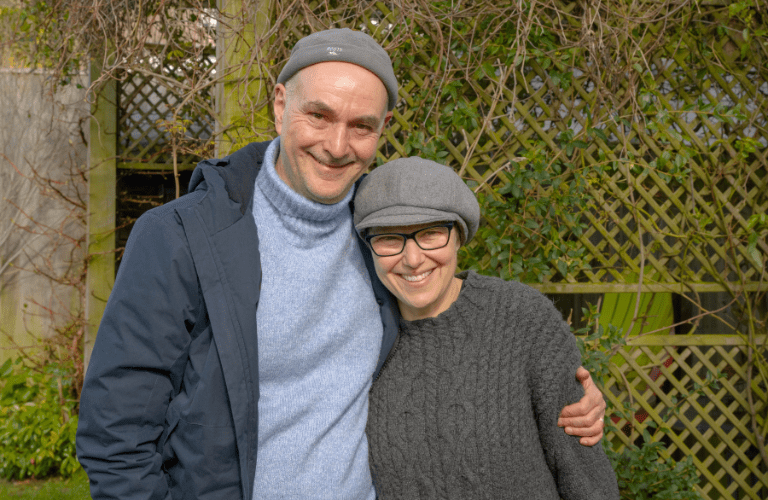
Maeve’s story
Maeve shares how she experienced symptoms of both young onset Alzheimer's disease and the menopause, and the importance of getting an accurate diagnosis.

An estimated 70,800 people in the UK are living with young onset dementia, where symptoms begin before the age of 65.
For some women, dementia symptoms may develop at the same time as perimenopause or menopause, which can bring additional challenges.
Perimenopause is the time leading up to menopause. A woman will still have periods – although they may be different from usual – and many have physical and mental symptoms caused by their changing hormone levels.
Menopause occurs when a woman has her last period. If you have not had a period for 12 consecutive months, you are post-menopausal.
The average age for menopause is 51, but it can happen earlier or later.
Perimenopause can last for months or even years before menopause. Women often start to notice symptoms in their early 40s, or sometimes younger.
Common symptoms include:
Because many symptoms of perimenopause also occur in dementia, some women worry that they are showing signs of young onset dementia, particularly if they have a family history of dementia.
For example, ‘brain fog’ is a very common symptom of menopause, with many women saying their brain feels like cotton wool. They may have difficulties with:
However, while people with young onset dementia do experience memory and concentration problems, these are not usually early symptoms; changes in vision and spatial awareness, language problems and changes in behaviour are more common in the initial stages.
Because it can be difficult to tell if these symptoms are related to perimenopause/menopause, young onset dementia or both, it is important to see a GP if you have any concerns.
There are also many other conditions that can cause dementia-like symptoms, and these should be investigated and ruled out or treated where appropriate.
Before your appointment, spend some time thinking about your symptoms, what treatments are available, and what outcomes you would like to achieve.
If you are supporting someone with young onset dementia, you can help by:
At your appointment, your doctor should discuss the stages and symptoms of menopause, lifestyle changes that may help, possible treatments and how menopause may affect your future health.
Women over 45 do not need tests to diagnose perimenopause, however, if a woman is under 45, her GP may run some tests to rule out other conditions.
Be aware that some healthcare professionals are not fully aware of the variety of menopause symptoms and might put changes down to the person’s dementia. Be patient but persistent – it may take several appointments to agree on a treatment plan.
The most common and effective treatment for perimenopause/menopause is hormone replacement therapy (HRT), which can be prescribed by a GP. HRT replaces or tops up the hormones that fall during this time.
It also reduces the risk of future health problems, including:
There are different types and doses of HRT, and different ways of taking it.
Oestrogen
This is the main hormone in HRT and is usually taken through the skin via a patch, gel or spray. It also comes in tablet form, but this may increase the risk of blood clots.
Progesterone
Women who still have a womb will need to take progesterone to keep the womb lining thin and healthy. The safest types of progesterone are Utrogestan, which comes in capsule form, or the Mirena coil: a small plastic T-shaped device that is inserted into the womb.
Testosterone
Taking a testosterone replacement alongside oestrogen and progesterone may help improve energy levels, sex drive, bone and muscle strength, brain fog and sleep. It comes as a cream or gel.
However, many GPs do not prescribe testosterone so you may want to seek advice from a menopause specialist.
Vaginal oestrogen
Vaginal oestrogen medication is used to improve symptoms like vaginal dryness and soreness, frequent urination, urine leakage, thrush and UTIs.
HRT should not interfere with medications for dementia, but it is important to discuss any treatments you are currently taking with your GP, psychiatrist or neurologist.
For the vast majority of women, the benefits of HRT far outweigh any risks, and perimenopausal or menopausal symptoms will usually improve after several months.
However, if you have any concerns, be sure to discuss these with your GP or a menopause specialist who can help you decide on the best type of HRT to meet your individual needs.
To speak to a dementia specialist Admiral Nurse about young onset dementia and perimenopause or menopause or any other aspect of dementia, please call our free Dementia Helpline on 0800 888 6678 (Monday- Friday 9am-9pm, Saturday and Sunday 9am-5pm, every day except 25th December), email helpline@dementiauk.org or you can pre-book a phone or video appointment at a time to suit you.
Dementia UK information
Other resources
Our virtual clinics give you the chance to discuss any questions or concerns about dementia, including young onset dementia, with a dementia specialist Admiral Nurse by phone or video call, at a time that suits you.

Maeve shares how she experienced symptoms of both young onset Alzheimer's disease and the menopause, and the importance of getting an accurate diagnosis.

Jude was diagnosed with young onset Alzheimer’s in 2021 aged 57. She lives in Oxford and is married to Becky. They have two daughters, aged 17 and 19.

Johnty’s best friend Jude was diagnosed with young onset Alzheimer’s disease in 2021, at the age of 57. Here he reflects on Jude’s diagnosis and the impact it has had on their lives.